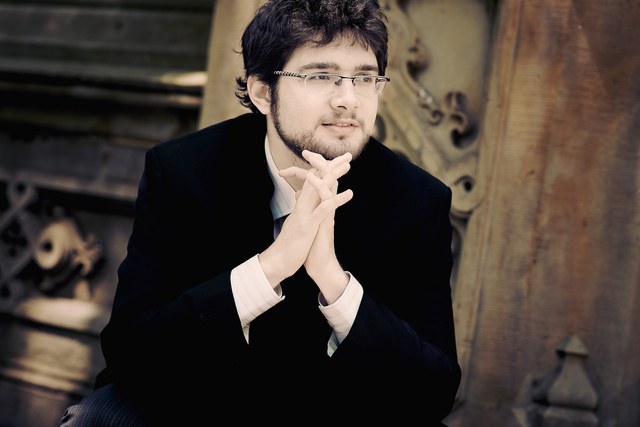Award-winning pianist joins Israel’s Haifa Symphony Orchestra for UNLV concert

If you’ve ever seen the movie “Shine” — showcasing Geoffrey Rush’s Oscar-winning portrayal of troubled Australian pianist David Helfgott — then you know all about “Rach 3.”
That would be Rachmaninoff’s Piano Concerto No. 3, a piece so daunting that, in the movie, it triggers an emotional breakdown when Helfgott, then a young prodigy, tries to play it in concert.
Pianist Roman Rabinovich understands the intimidation factor that, inevitably, accompanies “Rach 3.”
But it won’t stop him from playing it Thursday night, when Rabinovich joins Israel’s Haifa Symphony Orchestra — and principal guest conductor Boguslaw Dawidow — for a concert at UNLV’s Artemus W. Ham Concert Hall. Rounding out the program: Weber’s “Euryanthe” Overture and Tchaikovsky’s Symphony No. 4.
Thursday’s performance marks the Las Vegas debut for both Rabinovich and the Haifa orchestra, a collaboration that’s continued for almost two decades — which might not sound especially noteworthy, except for the fact that Rabinovich is only 28.
“I grew up with them,” Rabinovich says of the orchestra during a telephone interview from somewhere on the road, during the symphony’s three-month, coast-to-coast U.S. tour. “I played with them when I was 10 years old.” (At the same age, the young pianist also made his Israel Philharmonic debut with conductor Zubin Mehta.)
Usually, soloists spend a weekend with orchestras, the pianist points out, but his extended collaboration with the Haifa orchestra has created “a very special relationship,” Rabinovich adds. “You develop a sort of shorthand communication. You hear more details. You can be more flexible, more free, more in the moment.”
That sort of instinctive connection would play a crucial role in any musical performance, but the “Rach 3” isn’t just any concerto.
It’s renowned (or, as some might say, notorious) for being one of the most challenging works in the piano repertoire.
“It’s an incredibly difficult and complex piece,” he says, likening it to “kind of a monster” and “a wild animal you have to — what’s the word in English? — you have to tame.”
In part, that’s because composer Sergei Rachmaninoff also happens to be “the greatest pianist of all time,” according to Rabinovich — who won a gold medal at the 2008 international piano competition named for another definite “greatest pianist” contender, Arthur Rubinstein.
A concerto written by, and for, a piano virtuoso, the work presents a definite technical challenge for a pianist facing a constant cascade of notes that offer little chance to rest.
“And once you master the notes, there are so many musical challenges” confronting a pianist, Rabinovich adds. “Every performance, you experiment with different things — different tempos, different sonorities.”
Despite the monumental challenges for the pianist, “it’s very difficult for the orchestra as well,” the pianist notes. “It’s so dense — and the music is so intense. It’s so romantic and passionate.”
That kind of emotional involvement is exactly what Rabinovich first responded to when he began playing piano — at age 5.
“I came from a musical family,” he says. “My mom and my father were piano teachers.”
Born in Tashkent, Uzbekistan (when it was still part of the Soviet Union), Rabinovich and his family moved to Israel when he was 9 — about the time he began performing in public.
“I can’t say I was nervous,” the pianist recalls. “I was really looking forward to being onstage and communicating music to people.”
Even now, sharing “something that you love with other people” remains “a huge motor for me,” Rabinovich says.
So is the music itself — and learning about the composers who created it.
“It fills your life with passion,” says the pianist, who eventually left Israel to study in the U.S. — first graduating from Philadelphia’s Curtis Institute of Music, then earning a master’s degree at New York’s renowned Juilliard School.
Still based in New York, Rabinovich relishes the chance to see more of the U.S. during his concert tours.
“It’s an amazing experience,” he says, “to see so many places” — and “to play this amazing music day after day,” enabling him to “share something that you love with other people.”
He recently recorded his second CD, following last year’s recording debut, “Ballet Russes,” which features ballet music (by Ravel, Stravinsky and Prokofiev), arranged for solo piano — and earned him “artist of the year” honors from the Classical Recording Foundation.
In addition to music, however, Rabinovich also has been drawing since he was 10, and “art has been a big passion of mine ever since.”
Unlike his musical pursuits, “I never studied with a teacher,” Rabinovich explains. But he “became obsessed with art books and museums,” which became “really a huge part of my life.”
As a result, “I’m drawing all the time and painting all the time” — even on the road, where he has been “doing a lot of digital painting” on his tablet computer, he points out. (You can see some of Rabinovich’s drawings on his website, www.romanrabinovich.net.)
And while music and art may seem different, Rabinovich finds that “there are a lot of parallels” between them.
“There are tonalities in colors and colors in musical forms,” he points out, citing “structure and form and different textures” in both.
Besides, painting enables Rabinovich to create something that’s “there for a long time,” he muses, noting how in a concert, every note he plays is “there for a second — and then it’s gone.”
Except, of course, in the audience’s collective memory.
Contact reporter Carol Cling at ccling@reviewjournal.com or 702-383-0272.
Preview
Who: Pianist Roman Rabinovich with the Haifa Symphony Orchestra
When: 8 p.m. Thursday
Where: Artemus W. Ham Concert Hall, University of Nevada, Las Vegas, 4505 S. Maryland Parkway
Tickets: $25-$75 (702-895-2787, pac.unlv.edu)












